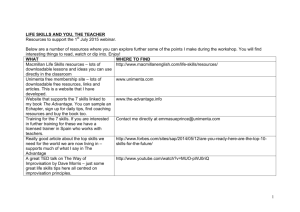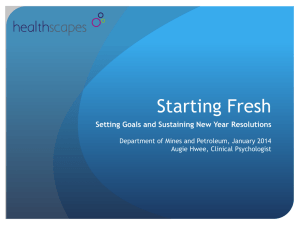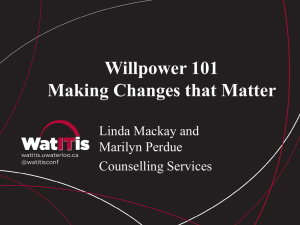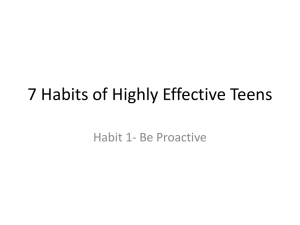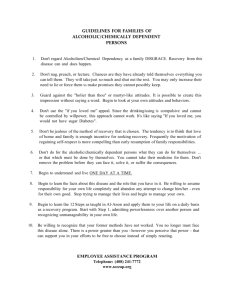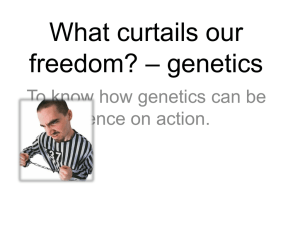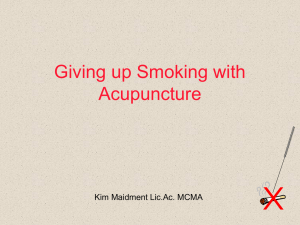Willpower Leveraging
advertisement
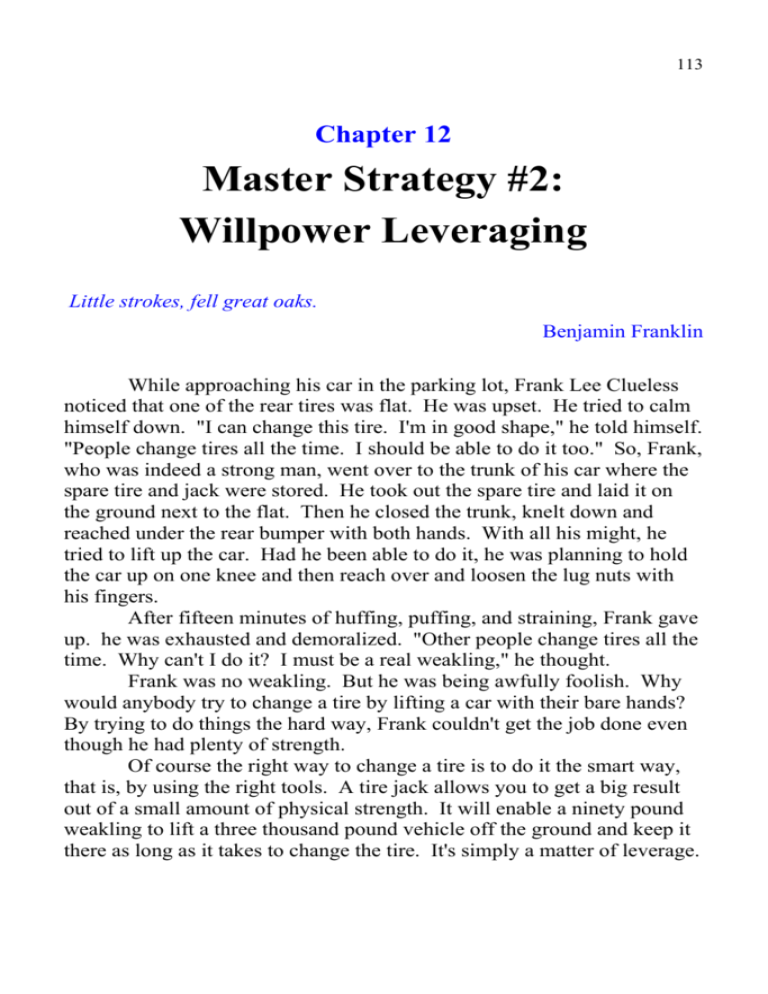
113 Chapter 12 Master Strategy #2: Willpower Leveraging Little strokes, fell great oaks. Benjamin Franklin While approaching his car in the parking lot, Frank Lee Clueless noticed that one of the rear tires was flat. He was upset. He tried to calm himself down. "I can change this tire. I'm in good shape," he told himself. "People change tires all the time. I should be able to do it too." So, Frank, who was indeed a strong man, went over to the trunk of his car where the spare tire and jack were stored. He took out the spare tire and laid it on the ground next to the flat. Then he closed the trunk, knelt down and reached under the rear bumper with both hands. With all his might, he tried to lift up the car. Had he been able to do it, he was planning to hold the car up on one knee and then reach over and loosen the lug nuts with his fingers. After fifteen minutes of huffing, puffing, and straining, Frank gave up. he was exhausted and demoralized. "Other people change tires all the time. Why can't I do it? I must be a real weakling," he thought. Frank was no weakling. But he was being awfully foolish. Why would anybody try to change a tire by lifting a car with their bare hands? By trying to do things the hard way, Frank couldn't get the job done even though he had plenty of strength. Of course the right way to change a tire is to do it the smart way, that is, by using the right tools. A tire jack allows you to get a big result out of a small amount of physical strength. It will enable a ninety pound weakling to lift a three thousand pound vehicle off the ground and keep it there as long as it takes to change the tire. It's simply a matter of leverage. 114 Following Through Working smarter Without even realizing it, people every day "do it the hard way" when it comes to following through. Like Frank, they rely on brute force alone - on their willpower - to get the job done. Enter the second follow through Master Strategy, Willpower Leveraging. In the same way that a tire jack increases what you can accomplish with the physical strength you have, Willpower Leveraging increases what you can accomplish with the willpower you have. Willpower Leveraging means taking one easy action today that makes it much more likely that you'll do the right thing tomorrow. This plot from an old low-budget movie should give you a good feel for what Willpower Leveraging is all about: A father and his young son were taking a long hike in the woods. All of a sudden, a werewolf jumped out of the brush, bit the father's leg, and disappeared again into the forest. The father, who knew all about werewolves, was alarmed but remained clear-headed. He realized that as a result of the bite, he himself would soon become a werewolf. What's more, he realized that, as a werewolf, he would have an irresistible urge to attack the first human he saw, which of course, would be his own precious son. The father had an idea. He took his son by the hand and rushed to a nearby spot in the woods where there was a large cage that had been abandoned long ago by trappers. He immediately got into the cage, slammed the door shut, and using the rusty padlock that had been left dangling on the door latch, he locked himself in. "Now when I turn into a werewolf," he explained to his bewildered son, "I won't be able to harm you, no matter how strong the urge is." The Werewolf Dad understood the master strategy of Willpower Leveraging. He knew that if he relied on his willpower alone, that his intention not to harm his son would be no match for the powerful primal urge he was about to feel. So he leveraged the willpower he had by locking himself in a cage. Realizing that it was about to become extremely difficult for him to follow through, he took one critical action now - when it was still relatively easy - that made it possible for him to behave in accord with his intention later on. Willpower Leveraging 115 allowed him to accomplish what he never would have been able to accomplish by relying on willpower alone. A Different Kind of Monster Kent wasn't a werewolf, he was an accountant. But every evening, as he relaxed in front of the TV, he felt like a monster - a cookie monster, that is. It wasn't at all unusual for Kent to polish off half a box of chocolate chip cookies in an evening. And when he was done, he felt guilty, stupid and fat. Kent decided to begin a serious campaign to stop eating so many cookies. The campaign didn't go very well. He felt strong and confident during dinner. But as he sat and watched TV, his resolve would weaken. He could almost hear the cookies call his name from the kitchen. He tried to resist. He tried hard. But usually, after an hour or so of struggling to "be good," he would give in to his craving. He would then go to the kitchen to have "just one cookie." Four trips to the kitchen and nine or ten cookies later, Kent, feeling like a beached whale, would finally stop eating. After about a week of progressively firmer promises and no follow through, Kent was ready to throw in the towel. "I'm so disgusted with myself," he complained. "Any idiot would have enough willpower to not eat cookies. I can't believe that I'm such a wimp." When Kent heard about Willpower Leveraging, it made sense to him. He quickly realized that all he had to do to solve his cookie-eating problem was to take one simple action: He asked his wife to stop buying cookies! She was happy to oblige. Kent got a lot of "bang" for the "buck" of willpower it took to ask his wife for help. With no cookies in the house, whenever he felt the urge to eat cookies, the thought of driving six miles to the grocery store at that time of night was a big enough hurdle to keep Kent cookie-free. Kent was finally following through, not because he was working harder, but because he was working smarter. Relying on willpower alone had gotten him nowhere. By leveraging his willpower, he was able to get the job done. 116 Following Through Attacking The Enemy: Opportunity And Convenience "My problem is that I've got eight credit cards, and I'm not afraid to use them," said Lance. "Seriously, I'm in debt up to my eyeballs. And instead of climbing out of the hole, I'm sinking deeper into it. I keep buying stuff that I shouldn't. I certainly don't plan to do it. But when I see something I want, if I can take it home with me, I just go ahead and buy it, whether I can afford to or not." Lance was hardly naive about money matters. He already had enough knowledge to give a very convincing lecture about budgeting principles and practices. But knowing how to manage his money wisely didn't help him at all - not until he also learned how to manage his willpower wisely. Lance was by nature an optimistic, impulsive and reactive fellow. He realized how easy it was for his "buying juices" to be stimulated. What he didn't realize, however, is how foolish and futile it was to try to control his buying impulses by wrestling them one-by-one to the ground. It hadn't occurred to Lance that he could leverage his willpower, that he could take easy actions now that would restrict his opportunities to buy no matter how much he felt like buying later on. Our goal was to convince Lance to cut up his credit cards and cancel all his charge accounts. "Lance, if you're really serious about getting out of this mess, do it right here, right now," we insisted, handing him a pair of scissors. "Convenience and opportunity have been your enemies, not your friends. The opportunity to conveniently buy things that you've decided you shouldn't buy is what's gotten you into this mess. You see, the easier it is for you to buy, the more willpower it takes to keep from buying. The harder it is to buy, the less willpower it takes to keep from buying. And if it's impossible to buy, it takes no willpower at all to keep from buying." Lance smiled, nodded in agreement, and then reached out to take the scissors. As he cut the first credit card, he made a little speech: "One small cut for American Express. One big step out of the hole for me." 117 Fido, The Incredible Follow Through Machine Willpower Leveraging can take a variety of forms. For the Werewolf Dad, it meant taking an action now that made it impossible to do the wrong thing later. For Kent, it meant taking an action now that made it a hassle to do the wrong thing later. For Pete and Karen, Willpower Leveraging meant taking an action now that bombarded them later with irresistibly compelling reasons to do the right thing. Pete and Karen had been struggling for some time to find a way to follow through on their intention to exercise regularly. They had tried everything. Pete joined a health club, but within just a few weeks, he stopped going. Karen tried getting up early to run before work, but within a few days, the only exercise she was getting was from hitting the snooze button on her alarm clock. They went out and bought an expensive piece of exercise equipment. They even put it right smack dab in the middle of their bedroom so that they couldn't possibly forget about it. Within a month, the exercise machine had become an extremely expensive clothes hanger. Then one night, after lamenting about how they just didn't seem to have enough willpower to stick with anything, Pete and Karen stumbled upon the perfect solution: "Let's get a dog!" they decided. Thanks to one easy action - adopting an adorable puppy named Casey from the animal shelter - Pete and Karen now get up early and walk every single day. They do it even when they'd rather sleep; even when the weather stinks; even when getting out of bed and going for a walk is the last thing in the world they feel like doing. Pete and Karen don't get regular exercise because it's healthy. They get it because, now that they have Casey, getting up and getting exercise feels like a necessity rather than just a good - but optional - idea. They get up and go for a walk because Casey whines to go out; because they don't want him to start barking and wake up the neighbors; because they don't want him to make a mess on the carpet; and because they love Casey and don't want him to be uncomfortable. So, for all the "wrong" reasons, Pete and Karen are finally doing what they were unable to do for all the "right" reasons. They're finally 118 Following Through getting the job done because they discovered leverage and stopped relying on willpower alone. The Moment of Truth Although we're sure that Napoleon never heard of Willpower Leveraging, he certainly understood the idea behind it. Napoleon discovered that the best way to get his soldiers to fight and fight passionately - was to leave them with no choice. That’s why he ordered his lieutenants to go back and burn the bridges that his troops had crossed on their way to meet the enemy. In other words, he made sure that they would move forward by making sure that they couldn't move backwards. “Burning your bridges behind you" is the very heart and soul of Willpower Leveraging. When you use Willpower Leveraging, you face a "moment of truth." This is the anxious point in time when you realize that, like the Werewolf Dad, you can choose to give up some freedom - you can burn a bridge - in order to lock yourself into following through. And once you've made the decision to burn a bridge, anxiety usually gives way to a great sense of relief. As one bridge-burner put it, "It's out of my hands now. Sure I've lost some freedom. But the freedom I lost was the freedom I had been using to do the wrong thing! Now I'm locked-in to doing the right thing. What a relief!" Do You Really Need To Lock Yourself In A Cage? It's rarely feasible to completely burn your bridges behind you. Fortunately, however, seldom is it necessary. You usually don't have to make it impossible to go backwards. You just have to make it difficult enough. Instead of burning bridges, you have to pile large enough obstacles on them. When Kent asked his wife to stop bringing home cookies, for example, he put a medium-sized obstacle on the bridge. He made an educated guess that having to get in his car and drive several miles at night just to get cookies would be a large enough obstacle to keep him from 119 retreating. Had it turned out that he was wrong, instead of giving up, he could have just gone back and placed a larger obstacle on the bridge. For example, he could have asked his daughter to park behind his car in the driveway every evening. So, on top of the obstacle of having to drive several miles to get cookies, he could have stacked the obstacle of having to ask his daughter, who was already giving him a hard time about his "cookie-belly," to move her car so that he could go "um...pick up something at the store." And if that didn't do the trick, he could go further yet. He could, for example, have his wife hide his car keys every night. The point is, there are lots of options between the extremes of keeping your bridges wide open and burning them completely. The trick is to make an educated guess about what it will take to keep you from retreating. Choose an obstacle and give it a try. If it doesn't work, don't stop there. Build on the obstacle or replace it with a bigger one. Keep experimenting until you’re moving forward. Reactions to Willpower Leveraging We asked several people we worked with to draw on their experience to give you a livelier feel for the benefits of using Willpower Leveraging. Here's what they reported: I'd say that my life has been simpler and my mind less cluttered since I learned how to use Willpower Leveraging. I used to waste lots of time and mental energy struggling to make and carry out a bunch of individual decisions when one decision is really all it would have taken. I had decided, for example, to start saving money regularly. I figured that two hundred dollars a month would be about right. At the end of every month, I'd start to think about saving. I covered the same ground month after month after month. I'd always come to the same conclusion - that I should put away two hundred dollars - but getting it done was such a hassle that sometimes I just skipped it. Willpower Leveraging made all the difference in world. I took just one action - I made one trip to the bank and told them to transfer two hundred dollars from my checking account to my savings account on the last day of 120 Following Through every month. I admit that I felt pretty nervous signing the papers. But then right after I did it, I felt relieved. Now I'm saving exactly the way I always thought I should. Plus, there's a big bonus. It's off my mind! That one decision automatically took care of everything. It's not a burden any more. I've learned that a little willpower applied at the right time can do wonders. I love everything about my favorite restaurant, except for the huge portion of delicious, crispy french fries they serve with their sandwiches. Actually, I love the fries. That was the problem! Even though I would set out every time to eat "only a few," I would end up eating every single one of those fries every single time. Although they were delicious, I felt lousy about what I was doing. Then, one day, on the way to the restaurant, I had an idea: When I order my sandwich, I'll just say, "Hold the fries." So, that's what I did. Although it took just a little bit of willpower to say those three simple words, doing it accomplished a lot. As the waiter left my table, I found myself letting out a great sigh of relief. I knew that I would be spared from the usual struggle. I knew that instead of needing massive amounts of willpower to fight - and still lose - about fifty individual battles with fifty irresistibly scrumptious french fries, just by saying "Hold the fries," I had won the whole "war" in one fell swoop! Hey, it might not sound like much, but Willpower Leveraging improved my lunch, my day, and my outlook. I felt like I was finally in control. And now that the waiter automatically asks me, "Should I hold the fries?” it's gotten even easier! Willpower Leveraging has really helped me deal with the problem of avoidance. I used to waste tons of time and energy avoiding things that, even though they were really important, just felt too difficult to do. I hoped they would get easier if I just waited long enough, but they only got harder. And as a result, not only did I fail to reap the benefits of following through with those things, but I spent lots of time fretting about them. 121 Take public speaking, for example. I’ve known for years that it would help my career a lot if I could give a good speech, but it’s always terrified me. To get over my fear, I kept promising myself that the next time I heard about an opportunity to speak, I would volunteer. But whenever an opportunity came along, I felt paralyzed. Although a part of me wanted to jump right in, another part of me wanted to run and hide. So instead of volunteering right away, I would put it off, hoping I would muster up enough courage to go ahead. But with each passing day, instead of getting more courage, I just got more scared. The bottom line is that I never did step up to the plate, even though I was frustrated with myself for just sitting on the sidelines. Willpower Leveraging helped me see that when I’m avoiding something important but scary, the key is to burn my bridges immediately, because the longer I wait, the more I’ll want to retreat. In other words, my desire to avoid gets stronger the closer I get to D-Day. So, the earlier I can commit myself, the better. So now when I hear about an opportunity to speak, I say “yes” right away, before the idea of actually speaking becomes real enough and scary enough to make me want to avoid it. That way, when reality sets in - and it always does - it’s already too late for me to back out no matter how much I feel like doing just that. I’m stuck, and that’s exactly where I want to be. And it's working great. Although public speaking still isn't my favorite thing to do, I'm getting pretty good at it as a result of all the practice. And, it turns out I was right about one thing all along: It is helping my career. When I first learned about Willpower Leveraging, I used it to help me follow through on some really important things in my life. But what’s been interesting to me is that now that I’m familiar with the strategy, I find myself using it quite often for little things. And I really get a kick out of how well it works. 122 Following Through For example, I recently used Willpower Leveraging to solve a problem with my exercise routine. I don’t have any trouble getting myself to walk every morning, but I haven’t been able to get myself to do upper body exercise like lifting weights or doing pushups. For one thing, I don’t have the time, and for another, I find that kind of exercise boring. On my way out for my walk the other morning, for some reason, my eyes stumbled on the hand weights that had been sitting on the shelf for months, and suddenly I had an idea. “Just pick up the weights,” I told myself. “Once you get out the door with the weights in your hands, you’ll have to carry them the whole way. Just pick them up.” So I did. My idea worked better than I expected. By the time I got back, my arm and shoulder muscles ached from all the exercise they’d gotten. I felt great about having, in effect, put one over on myself. It was so easy, it was actually amusing. By exerting one tiny bit of willpower, I had set things up so that I would get a half hour of good upper body exercise. Since then, every morning on the way out the door, I grab the weights.
